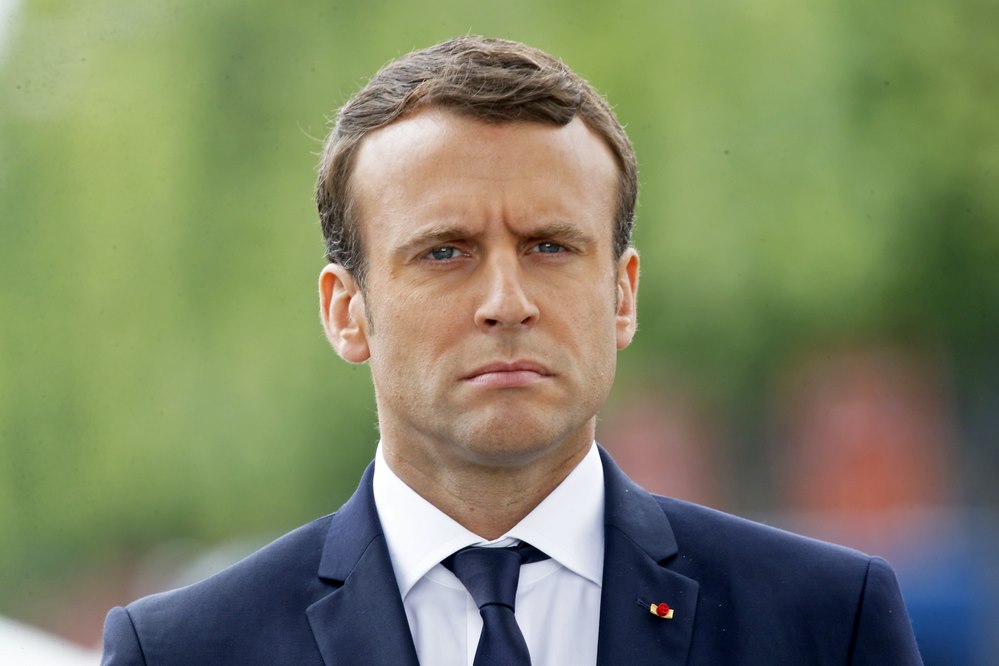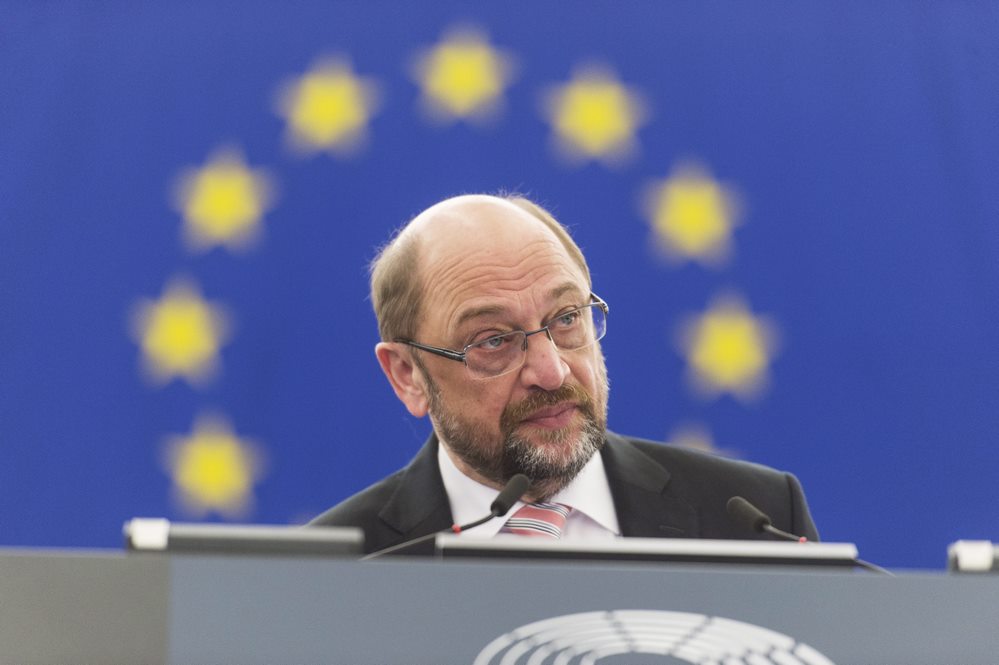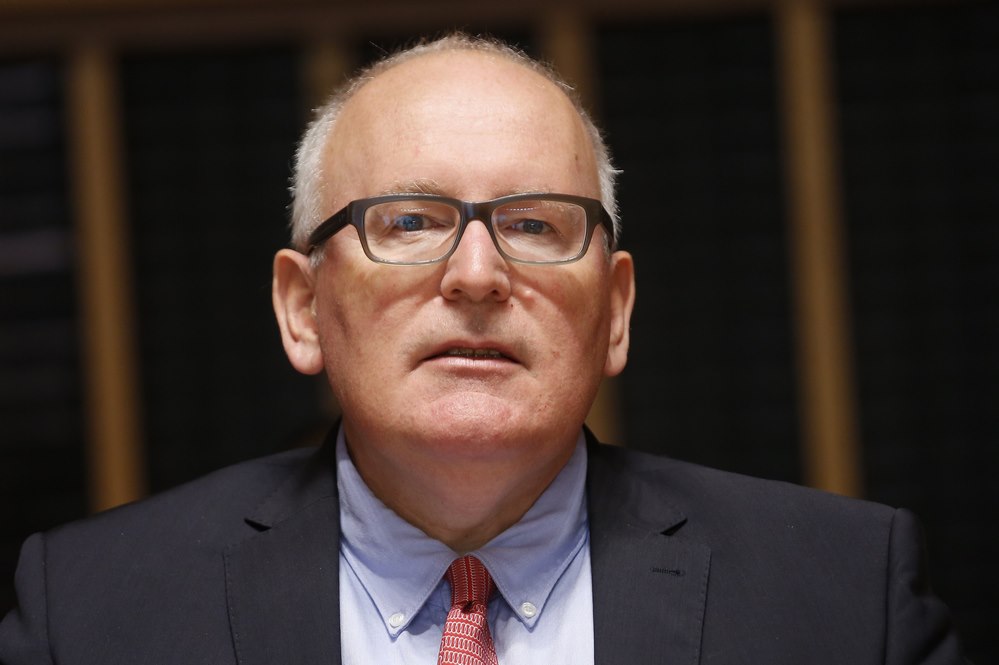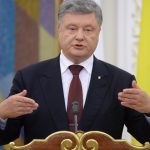THE WARSAW INSTITUTE REVIEW
Date: 15 May 2017 Author: Rafał Zgorzelski, PHD
A Strong Poland in Europe
Poland, interested in good cooperation with France, Germany and its other European partners, has an essential role to play in the process of returning to the roots and ideas that illuminated the founding of the European Union. Poland needs a strong Europe, and Europe, the European Union, needs a strong Poland, open to cooperation with countries of the “Old Union”, and politically active in East-Central Europe.

Poland’s critics: Macron, Timmermans, Schulz
On Sunday, May 7, 2017, the second round of the French presidential election took place, ending in the victory of center-left politician Emmanuel Macron, the leader of the En Marche! movement (which recently changed its name to République En Marche!). Macron received 66.1% (20,753,798 votes), with 33.9% (10,644,118 votes) cast for his opponent, Marine Le Pen, president of the Front National (a position that she temporarily stepped down from on April 24, 2017, to focus on campaigning during the second round of elections), amidst 74.62% voter turnout, the lowest in France since 1969. It’s worth noting that 12 million eligible voters did not take part in the election, while over 4 million voters cast incomplete or invalid ballots
In his presidential campaign, Emmanuel Macron repeatedly stressed that he would do everything in his power to keep France faithful to its republican principles of “freedom, equality and fraternity,” and declared the building of a strong position for his country in the European Union, as well as the implementation of reforms that would bring flexibility to the labor market and restore the competitiveness of the French economy. In foreign policy, Macron clearly wants to tighten relations with Berlin, which is meant to strengthen the French economy.
During the election campaign, Macron repeatedly issued strong warnings that he would push to introduce EU sanctions against Poland for alleged labor cost dumping (social dumping), especially after the Whirlpool Corporation decided to relocate its facilities from Amiens in France to Poland, and for Poland’s disloyalty regarding the migrant situation (Emmanuel Macron is in favor of the uniform distribution of refugees across EU countries). He was particularly uncomplimentary towards Jarosław Kaczyński, President of Law and Justice, the party currently governing Poland. He not only called him Marine Le Pen’s “friend and ally”, but more notably lumped him into the same group as Hungarian Prime Minister Viktor Orbán and Russian President Vladimir Putin. This last judgement, to put it very gently, leaves doubt as to his competence in international diplomacy.
Emmanuel Macron eagerly uses rhetoric and slogans of democratic values such as freedom, equality and fraternity, that speaks to a large part of European public opinion. On the other hand – and it’s hard to fault him for it – he is pushing slogans in favor of strengthening the position of the French economy (leaving aside the question of whether his proposed reforms can actually achieve their stated goals). He understands the terms “freedom, equality and brotherhood”, as correct when it comes to securing the interests of his own country and the interests of his closest allies for the purpose of bringing his political visions to reality. The same concepts are seen as wrong, when respect for such rights (including the right to strengthen one’s own position, economy, place in international politics and the presentation and implementation of one’s own ideas) is demanded by other countries, like Poland and Hungary.
As an example, Macron underscores the need for Poland’s loyalty towards the EU. Nevertheless, as Minister of Economy, Industry and Digital Affairs (2014-2016), in the government of Manuel Valls, the current President of France co-created the Loi Macron act of 2015, which was strongly opposed by his Polish allies, and was de facto aimed at Polish truck drivers, with the goal of weakening their strong position in the international transport sector. He supported a legal regulation that clearly discriminated against foreign competition. We will return to the question of France and loyalty later.
One of the leading critics of the reforms being implemented by the Law and Justice government, is the left-wing, Dutch politician and diplomat, national deputy, foreign minister in the government of Mark Rutte (2012 – 2014), and the current Vice-President of the European Commission, Frans Timmermans. He has repeatedly pointed out that the current situation in Poland allegedly constitutes a “fundamental threat to the rule of law” and has threatened EU sanctions against Poland. He has spoken out about Hungary in a similar way. He also emphasized that the European Union is built on values that include respect for democracy. Timmermans has been especially critical towards the Polish authorities’ actions against the judiciary, which is perhaps one of the most pathologically functioning institutions in the country, and undoubtedly in need of thorough reforms. The justice system today being one of the key legacies of the postcommunist reality.
The same type of rhetoric as used by Timmermans has been repeatedly used against Poland by Martin Schulz, the German politician, Eurodeputy, leader of the socialists in the European Parliament, and President of the European Parliament (January 17, 2012–June 18, 2014 and July 1, 2014–January 17, 2017), and current Chairman of the Social Democratic Party of Germany. He is known for his sharp tongue and aggressive rhetoric, and has accused the Polish government of seeking a coup d’etat. Also, from the floor of the European Parliament, he has insulted not only Jarosław Kaczyński and Viktor Orbán, but also Italian Prime Minister Silvio Berlusconi. Schulz, like Macron, demanded “solidarity” from Poland on the refugee issue.
It is not possible, for the purposes of this text, to list all of the admonitions leveled against Poland or Hungary by Timmermans, Schulz and others, especially leftist politicians from the European Union. It also doesn’t make sense to explain the differences in foreign policy between Law and Justice and the National Front for example (in matters such as relations with the United States, the annexation of Crimea by Russia and the deployment of NATO troops on the eastern flank of the European Union), or the differences in the political views of Jarosław Kaczyński and Viktor Orbán on issues such as cooperation with Putin’s Russia. It also wouldn’t be appropriate to explain to the President of France the differences, including civilizational ones, between the traditions and models of governance in Poland, Hungary and Russia.

It should be stressed, however, that the people who are criticizing Poland either do not have sufficient knowledge about the situation that it finds itself in and the changes taking place there, or are applying the principle that it is right for their own countries to seek their own interests, but completely inappropriate when other countries do the same. Following this idea, the European Union is expected to operate according to principles that the French, Dutch, or Germans, and politicians such as Macron or Timmermans or Schulz expect, and countries like Poland should submit to their vision of community and democracy. It is worthwhile in this situation, when leftist, Western politicians, either on their own initiative or at the suggestion of their Polish allies, obviously distort reality, to respond with a few words about how things really are, and what role Poland plays in the European Union.
What is Poland’s role in the EU?
Poland today is a country that, through successive aspects of the political transformation it went through after communism’s collapse in Poland and East-Central Europe at the end of the last century, is steadily developing. This is also due to the intellectual attitude and entrepreneurship of Poles themselves, which is not necessarily connected with the legislative approach or the policy of various authorities or the state. A lively emancipation is occurring in Polish education, culture and art, the economy, sports and other fields, in which Poles and Poland often achieve significant success, including in the international arena. The internal politics of the state have also changed, in which, apart from the central administration, territorial self-government plays an increasingly important role. Numerous non-governmental organizations — associations, foundations, trade unions and business associations, civic movements and other voluntary associations — are formed and have developed without serious hurdles by all those who feel the need for social activation and commitment.
In Poland, citizens enjoy freedoms that aren’t in any way limited.
Poles can freely express their beliefs and manifest their values, worldviews and philosophies during many conferences organized around the country, symposia, debates, protests, demonstrations, anniversary celebrations and marches. They are equally free to create and develop political parties in order to influence the shape of national politics. They can organize religious life under the equal protection of the law, conduct business activities freely, develop family farms and everyone also has the right to the legal protection of private life, family life, the right to their good name and to decide about their personal life. Polish citizens also have the right to obtain information on the activities of public authorities, including economic and professional, self-governing bodies, as well as individuals and organizational units, insofar as they carry out the tasks of public authority and manage the assets of the state. Every citizen of Poland also has the full right to property and the freedom to dispose of it as they see fit, freedom to choose and carry out an occupation and their place of work, the right to safe and hygienic working conditions, education, and health and social security in case of disability.
Poland is a fully democratic country in which citizens’ freedoms are fully respected, and in which every citizen can freely articulate their views. It’s a country where full freedom of the press and other mass media, and the acquisition and dissemination of information is guaranteed, as well as the free exchange of thought and discussion; a country where everyone is equal before the law and can expect equal treatment by public authorities, and where no one can be discriminated against in political, social or economic life, for any reason. Poland also provides its citizens of national and ethnic minorities the freedom to preserve their own language, customs and traditions, and to develop their own culture.
Poland today is a country where the democratic freedoms of its citizens — with all the problems and shortcomings of contemporary democracy — have never been as strong as they are now.
Poland, like other countries of the EU already mentioned (France, Germany and the Netherlands), struggles with various problems, the creation and resolution of which is part of everyday reality. These problems are largely analogous, including the phenomenon of over-regulation, bureaucracy and (to varying degrees) unemployment. In Poland, as well as in other countries, these are issues around which often heated political disagreements take place. In evaluating these issues, it’s worth remembering though that many of these difficulties are largely the result of the former, ineffective, unrealistic, socialist system, or the incomplete systemic or economic reforms of the state. These types of pathologies appear in the judiciary, and the health and social security systems, and hamper the functioning of many government agencies.
Poland’s leaders have been tasked with rebuilding and strengthening the country’s internal position, as well as its external position in international politics. In the domestic politics of the country, a natural strengthening of socio-political currents is occurring, towards national solidarity, the elimination of systemic pathologies, the equalization of social opportunities, the development of Polish families and internal independence. After years of functioning in the communist system, it also turned out to be necessary to rebuild national identity, through the active historical policy of the state. Poles are proudly restoring the memory and history of those who gave their lives for a free and independent Poland during the German occupation of World War II, as well as the Soviet domination in East-Central Europe, such as the memory of the Steadfast Soldiers (Żołnierze Niezłomni) of the Independence Underground (the special duty of the state is also to care for veterans who fought for independence), who took up arms against two occupiers in the name of a free and democratic Poland. But also the memory of those who shed blood for “freedom, equality and brotherhood” (Macron’s slogan), for an independent and democratic France, Netherlands, Belgium, and the United Kingdom (democracy, the likes of which Timmermans and Schulz readily argue for), and whose homeland, against their will, was given away at the Tehran, Yalta and Potsdam conferences, under the domination of Soviet Russia for forty-five years.
Multi-speed Europe?
At present in the European Union, different views are clashing, as each country is fighting for its own political and economic goals. This doesn’t change the fact that Europe needs, besides expressive and wise leaders with real political ideas, the solidarity that underlie its unification. In a changing world, the position of the European Union depends to a great extent on the good cooperation of the “Old Union” states and members admitted to the community after the political transformations in East-Central Europe, states which are in Europe and co-create it – like France and Germany. These states have the full right to convince their political partners of their own political ideas, to necessary changes in European law and the preservation and full respect of one’s own identity and national sovereignty.
Politicians like Macron, Timmermans and Schulz have the obvious right to express their views, but not to speak untruths about or insult Poles and Hungarians. They also have the right to disagree with Jarosław Kaczyński or the views of the Polish government, and to build a political majority for the promotion of their own purposes. These politicians, however, are simply not entitled to demand the loyalty of all EU Member States to the established principles of the functioning of the community, but also have the obligation to pursue the interests of all EU citizens. Mainstream politicians, accustomed to unilaterally deciding on the fate of the EU, cannot not draw conclusions from Brexit. There’s a need to change the narrative – slogans that increasingly serve the purpose of demagoguery, mainly from the European left, which serve as threats to all those who dare to have contrary opinions, different approaches or views of reality; or those who are just steadfast in pursuing their national interests. Understood in this way, “freedom, equality and brotherhood” cannot be accepted by Poland. Poland, and Hungary for that matter, is a fully democratic state where the authorities have taken power based on the mandate of the people, with the right to implement the political programs that millions of their countrymen have opted for. European public opinion deserves reliable information and genuine knowledge about Poland and its approach to European affairs.
In Poland, the overwhelming majority of society not only supports EU membership, but also identifies with the political project of the Law and Justice party, and expects a radical change in the country’s existing domestic policy. Hence, all the support in the parliamentary elections for Law and Justice (which received 37.58% or 5,711,687 votes in elections to the Sejm [lower house of parliament] and 39.99% or 5,993,433 votes in elections to the Senate [upper house]) and the Kukiz ’15 party (with 8.81% support in the Sejm elections or 1,339,094 votes, and, nominating a limited number of candidates to the Senate, obtained 1.38% or 207,156 votes). The main opposition party, the Civic Platform, received 24.09% or 3,661,474 votes in the election to the Sejm and 28.85% or 4,323,759 votes in the Senate elections. Ryszard Petru’s Modern party received 7.60% or 1,155,370 votes to the Sejm, and also with a limited number of candidates, 2.63% or 394,817 votes to the Senate. It should be emphasized that, according to various electoral polls carried out in Poland, the support for Law and Justice has remained steady since the parliamentary elections in 2015, which means that Poles are strongly identifying with the reforms proposed by the government of Prime Minister Beata Szydło. It is also worth adding that in the last presidential election in Poland in 2015, the Law and Justice candidate, Andrzej Duda, was victorious (receiving 51.55% or 8,630,627 votes, compared to 48.45% or 8,112,311 votes for the Civic Platform candidate, outgoing President Bronisław Komorowski).
In respect to the appeals of European politicians such as Macron, Timmermans, and Schulz, it is important to remember that Law and Justice has the full mandate of Poles to exercise power. The opposition can and should criticize the work of the authorities, but any potential criticism should be substantive and constructive by proposing solutions that are better than those recommended by Law and Justice. The proclamation of egregious falsehoods about the threat to democracy under the rule of Jarosław Kaczyński is both unwarranted and harmful.

Let us return again to the question of expecting loyalty. In demanding loyalty regarding the migrant issue from a country like Poland, whose leaders see the growing risks and threats of Islamic terrorism, and which was never a colonial empire, nor did it dominate the societies of other continents for decades, or interfered in the construction of other states’ political systems, it is countries such as France that have an obligation to act loyally towards Poland.
A test for this could be the approach of Poland’s political partners in the European Union or the European Commission to the issue of building the Nord Stream 2 gas pipeline, which is opposed by Poland, the Baltic States and Ukraine (the same Ukraine that the “Old Union” countries frequently declared favor for, although it is not a member of the community). Nord Stream 2 is to be built at the bottom of the Baltic Sea, parallel to the Nord Stream gas pipeline launched in 2011, as a twin pipeline system with a transmission capacity of 55 billion cubic meters from Russia to Germany. Russia, criticized by Macron and much of France’s political elite, the Netherlands and other EU countries, announced it will stop gas distribution into pipelines running through Ukraine. Based on publicly available information, the five European partners of Gazprom — Engie (France), Royal Dutch Shell (Netherlands-United Kingdom), Uniper and BASF-Wintershall (Germany) and OMV (Austria) — intend to co-finance the project with loans of approximately 950 million euros, which will constitute 10% of the cost of the whole project, estimated at 9.5 billion euros. Russian Gazprom and its Western partners intend to provide the Nord Stream 2 AG corporation, responsible for the construction of the pipeline, with a loan of up to 6.65 billion euros.
So what’s up with French loyalty and their questioning of cooperation with Putin’s Russia? What will be the future of this de facto Russian-German project, around which a lot of controversy has arisen, including whether Nord Stream 2 is consistent with European Union law, as well as key assumptions of the Energy Union? The solution to this issue will not only be essential for the development of European energy policy and the energy security of East-Central European countries, including the Member States of the European Union, but also for the credibility of the European Commission and of the entire community. Besides hearing the opinions of Macron or Timmermans or Schulz on this matter, consequences and decent behavior should be demanded from them, as well as truthfulness in commenting on political and economic realities. In this sense, it appears that Russia is bad when it occupies Crimea, but is good when it comes to making specific economic or political deals.
What then does the European Union need today? A Europe with a strong foundation, a community built upon the values of Greek philosophy, Roman law and Christianity, as well as the independence of the nation-states that co-created it. A return to the ideas of its founders. If it doesn’t hoist itself out of crisis, it will permanently lose its place in the world and will be replaced by Asia. Building the European Union on these foundations is certainly not a guarantee given by left-wing politicians, seeking in the long-term perspective, to transform the community into a more homogenous political and economic body, contrary to the expectations of European societies and the foundational ideas of the EU.
***
I write these words from the position of a politically uninvolved person, an average participant in social life, who has, like other citizens of Poland or the European Union, the right to express their beliefs and — in perceiving various problems — by no means feels in any way restricted by anyone or anything. I write about it because I feel the need to. For I think that Poles need a proud and strong Poland, a strong Poland in Europe as a stable state, and one that respects its own sovereignty as an entity, and an actor in and not simply subject to international politics.
A person who, if he did not try to understand the mechanisms of politics, and the playing on human emotions to build political capital, could be somewhat astonished at positions or claims that things are otherwise.
All texts published by the Warsaw Institute Foundation may be disseminated on the condition that their origin is credited. Images may not be used without permission.










